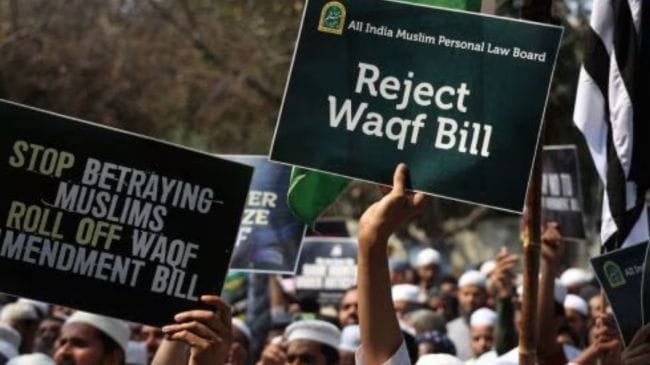Oppn says SC’s Waqf order halts ‘govt conspiracy’, Govt calls it ‘stamp’ on Parliament authority
AIMPLB expresses disappointment, says it had expected a stay on all the provisions of the Act.
 Congress spokesperson Shama Mohamed said that the interim order was a “welcome step”. (File)
Congress spokesperson Shama Mohamed said that the interim order was a “welcome step”. (File)
WHILE THE Opposition welcomed the Supreme Court’s interim order Monday on the Waqf (Amendment) Act, 2025, saying “it put a hold on the conspiracy and the intention of the government”, the BJP called it a “positive development” and the Court had clearly laid down Parliament’s supremacy.
Congress president Mallikarjun Kharge said the apex court’s order “reaffirmed its resolve to protect the rights of minorities – a cause for which the Opposition stands united against the Modi government”. “The BJP had sought to bulldoze (through) a divisive law, designed solely to inflame communal passions and reopen issues that India had long settled,” said Kharge.
However, Union Minister for Minority Affairs Kiren Rijiju interpreted the court order as a “stamp” on the fact that “no one can challenge the authority of Parliament in courts”. “I welcome the order passed today… What has been decided by the Bench of the Supreme Court is a very good sign for democracy in the country.”
Rijiju noted that detailed debates were held in both Houses on the Act. “It was the longest (discussion) in the history of Indian Parliament. After such detailed discussions, it (the Act) cannot be scrapped, and that is what the Supreme Court has put its stamp on.”
Congress MP and communications in-charge Jairam Ramesh called the order “a substantial victory” for Opposition parties and “all those members of the Joint Parliamentary Committee who submitted detailed dissent notes”.
Ramesh said the counsel for the Opposition parties who were among the petitioners in the case had argued against the Act’s provisions saying their “intention” was “to keep the voter base inflamed and create an administrative structure to indulge those seeking to foment religious disputes”. “With this order, the Supreme Court has stayed the powers of a collector (in determining whether a property was Waqf), protected existing Waqf properties from dubious challenges, and stayed the provision requiring proof of being a Muslim for five years (to make Waqf endowment), until such times as rules are framed,” said Ramesh.
Congress MP Imran Pratapgarhi, who is one of the petitioners against the Act, thanked the apex court for Monday’s order. “It is a big relief… The Supreme Court has put a hold on the conspiracy and the intention of the government.”
The All India Muslim Personal Law Board (AIMPLB), however, expressed disappointment over the Supreme Court’s interim order, calling it incomplete and unsatisfactory. AIMPLB spokesperson S Q R Ilyas said the Muslim community, the Muslim Personal Law Board, and “justice-seeking citizens” had expected a stay on all clauses of the Act.
“While the Court has granted partial relief, it has not addressed the wider constitutional concerns,” Ilyas said, listing “other harmful provisions”, “including the prospective de-recognition of ‘Waqf by user’ and the mandatory requirement of a Waqf deed, which goes against the established tenets of Islamic law”.
Addressing a press conference at the Samajwadi Party headquarters in Lucknow, Akhilesh Yadav said the Opposition had been clear in Parliament “that the government should not interfere in Waqf”. He hoped the Supreme Court would deliver justice in its final order.
Trinamool Congress MP Sagarika Ghose said the most “contentious clauses” of the Act were stayed by the Supreme Court and that it was “an important message to the rickety (Prime Minister Narendra) Modi coalition”.
CPI MP P Sandosh Kumar said the apex court’s intervention “confirms what the party has consistently argued”, about the amendments “being hurriedly pushed through by the BJP without proper discussion with the Muslim community or representative organisations”.
The Jamaat-e-Islami Hind (JIH) said the order has “provided some relief to the Muslim side and has created hopes for the future”. “We are hopeful that when the final judgment comes, all our apprehensions about the amendments will be addressed in a much better way and more relief will be provided,” JIH vice-president Salim Engineer said.
He also called the interim judgment a setback to the Central government’s “divisive agenda and the agenda of polarisation”.
Rijiju said the Waqf (Amendment) Act provisions will only benefit the Muslim community and stop “the misuse of properties through Waqf”. “It (the Court) has kept intact the decision of Parliament, (except for) one aspect of ‘practising Muslims’. We will see it through rules and what has to be done. But overall, the judgment’s spirit is very good for the country and Parliamentary democracy.”
BJP leader and former Union Minister for Minority Affairs Mukhtar Abbas Naqvi slammed the Opposition for its protests against the Act. Speaking to The Indian Express, he said: “Unfortunately, the corrupt lobby wants a licence to loot… That is why they are trying to create uproar, commotion and imaginary illusions.”
JD(U) spokesperson Rajiv Ranjan Prasad said: “… The fact that the apex court has refused to stay the Waqf Act in entirety is a major setback for the Opposition, which has been spreading misinformation about it.”
Another BJP ally, LJP (Ramvilas), said: “There is nothing new in the order… The case will henceforth be argued on merits.”






